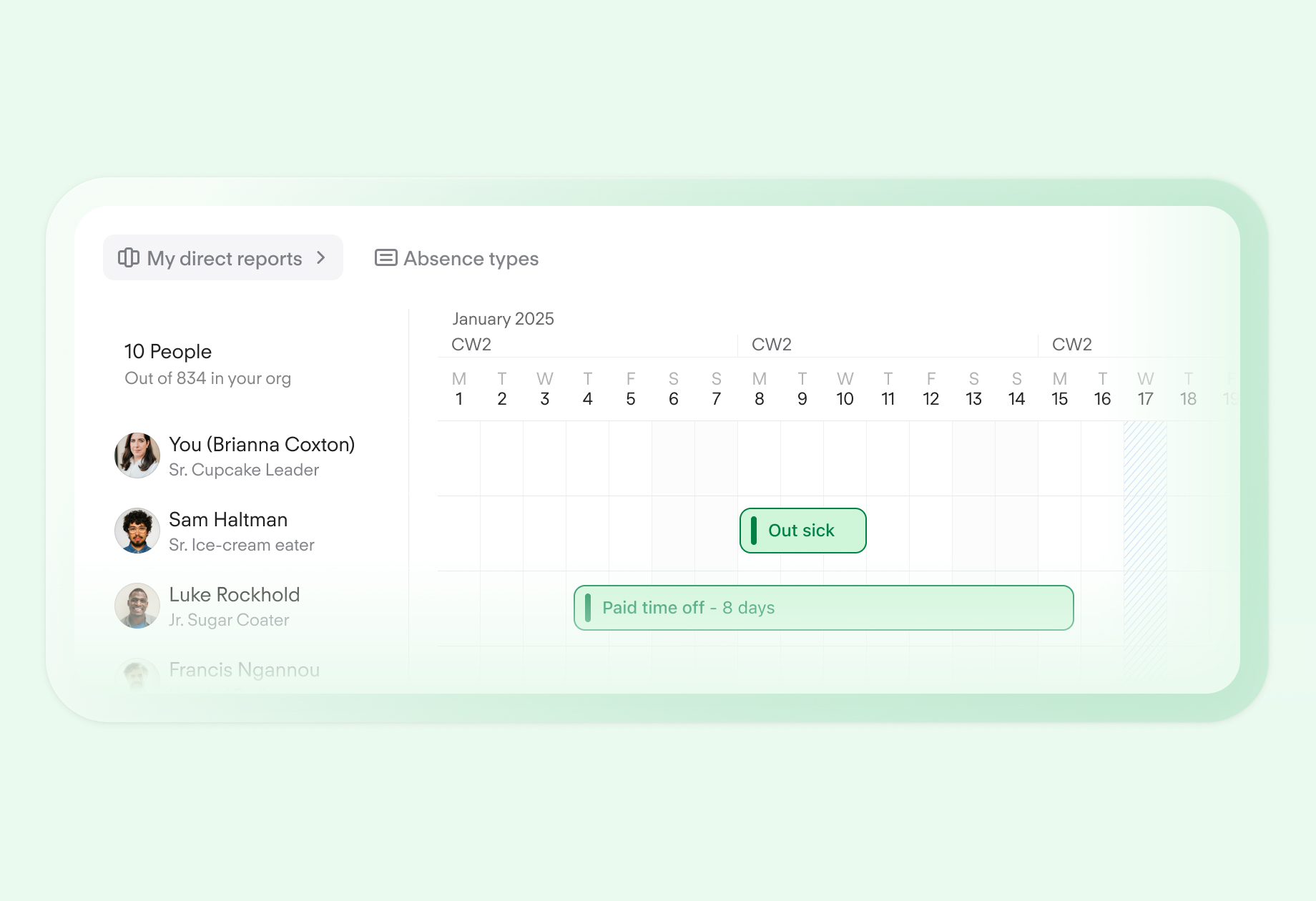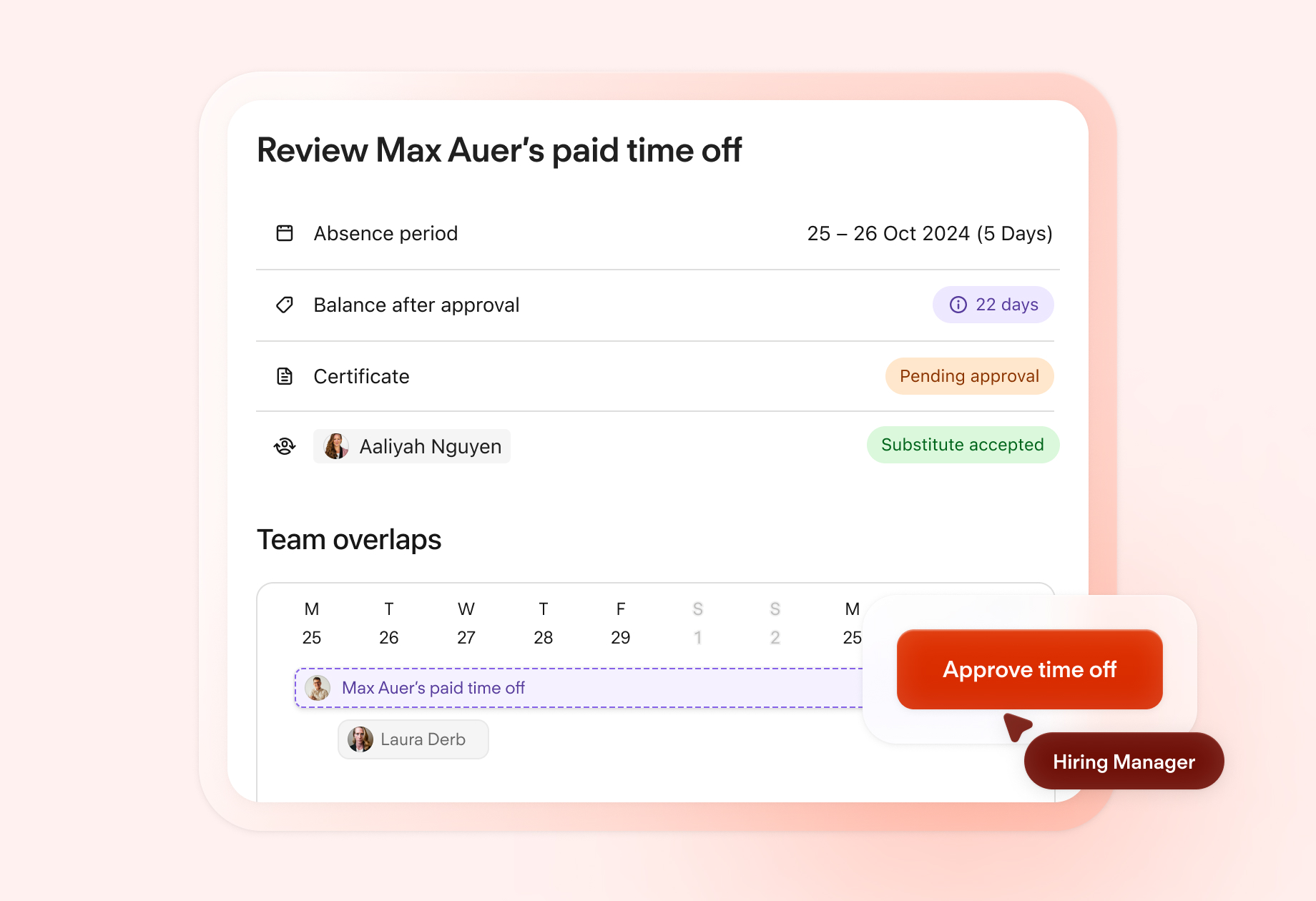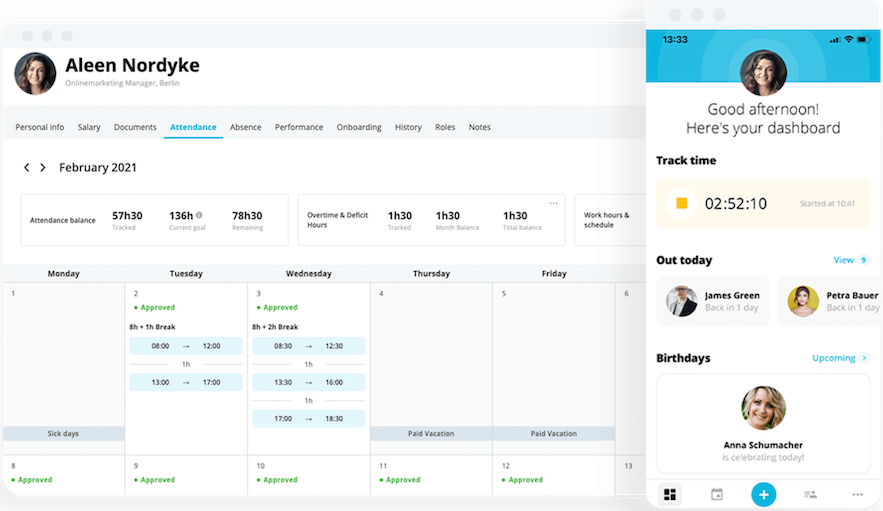Should you offer employees duvet days?

How do you know if your employees are in need of a duvet day? What is it in the first place? Should your organisation be promoting them, or should you have a policy recognising them at all?
Let's take a look at what a duvet day is, its importance in the workplace, and how you can build a policy regarding them into your employee handbook.
Managing absences is simple within Personio. Learn more today.What is a duvet day?
A duvet day is an allotted amount of time, separate from holiday time, where an employee can take off without having to provide any notice. This is often done in an impromptu fashion, and could just as easily be considered a self-care day.
It’s not the same as a sick day for multiple reasons. Think of them more as an approved, (usually) paid, one-day holiday. They are also:
Typically built into an employee’s remuneration package
Are part and parcel with an annual holiday allowance
Do not require advanced notice (though companies prefer it)
Where does the term ‘duvet day’ come from?
Duvet Days are a fairly new concept, originating in 1997 and coined by the UK company August One Communications. Over the years, the concept’s popularity has increased in the UK and is now spreading across the pond and gaining momentum in the United States, as well.
Why do duvet days exist?
There’s an unattributed quote that says, "If you don’t pick a day to relax, your body will pick it for you."
When we push ourselves—physically or mentally—there’s bound to be a breaking point. This is exactly why Duvet Days came into being. Instead of employees continually pushing themselves to the point of burnout or breakdown, they can take a day—scheduled or not—to rest and reset.
Manage Absences With Ease

Enable employees to quickly and efficiently apply for leave, automatically notifying their managers and marking them absent in their calendar once approved. Give HR a detailed overview of leave across the company.
Transform Your Absent ManagementHow duvet days improve the workplace
The advantages of duvet days are clear: An employee can take a day off work when they need the extra time to relax, while not having to worry about missed wages. But there’s more to it than that. They can also positively impact many factors in the workplace, from employee health and wellness to retention to communication.
Here’s how duvet days can improve the workplace on every level:
1. Improves employee mental health
Employee stress is on the rise in the UK, with 79% of employed adults experiencing work-related stress. The most common stress factors for employees include work-related politics, lack of communication, and others’ work performances.
Stress can easily build until the point of burnout, causing employees’ morale, motivation, and productivity to fall, sometimes resulting in their leaving the company altogether.
That said, 36% of adults believe duvet days help with their stress and anxiety, giving them the opportunity to recoup lost motivation, time, sleep, and energy.
2. Encourages Honesty, Reduces Stigma
Stress and mental health aren’t easy subjects to broach at work. Ninety-five percent of employees have taken time off work due to stress, but gave their employer a different reason for their absence.
This can add even more anxiety to the situation. When an employer offers duvet days, employees never have to fake a cough or illness to get time off work. Instead, they receive the time off they desire without having to lie to their employer—or give a reason at all.
Ultimately, it creates an environment of openness and honesty, which can branch out into every relationship in the workplace.
3. Increases employee performance
There’s no doubt that a relaxing vacation can leave you recharged and reinvigorated. The same goes for duvet days, though on a smaller scale.
When tacked onto a weekend, a single day can add enough time for an employee to decompress and recharge, increasing their productivity and motivation when they return to work.
Even simply getting more sleep on their day off can improve an employee’s brainpower and productivity. This is especially true for women, 24% of whom struggle to complete projects at work after a poor night’s sleep.
4. Attracts top-tier talent
Providing more comprehensive, competitive benefits around duvet days and wellness overall can help attract in-demand talent for your team.
After all, employees are more likely to accept a job if it has a fitness and wellness package, and 65% of people would be more likely to take a job if the company specifically offered Duvet Days.
Another interesting fact is that, according to a joint report from Dreams and Loughborough University, 33% of employees say they’d be less likely to look for another job if their employer offered sleep support.
Manage Absences With Ease

Enable employees to quickly and efficiently apply for leave, automatically notifying their managers and marking them absent in their calendar once approved. Give HR a detailed overview of leave across the company.
Transform Your Absent Management5. Decreases absenteeism
While providing employees with more days off may seem counterproductive to decreasing absences, in the long run, it can pay off. For UK workers, poor mental health and stress are two of the most common causes of long-term absences in the workplace.
Providing employees with Duvet Days throughout the year can help curb that long-term absence rate, as it gives them consistent opportunities to manage and improve their stress or poor mental health, instead of it building up and culminating in long-term leave.
Here’s how to manage the eight key causes of absenteeism in the workplace.
6. Leads to happier, healthier employees
However an employee chooses to use their Duvet Day, it will likely have positive impacts on their career outlook and overall well-being.
In fact, simply knowing that they have the option to book one gives them a more positive outlook on their employer, while gaining extra rest on their day off can increase their productivity and motivation.
Are duvet days right for your company?
While duvet days are known for being a Millennial-inspired workplace perk, companies of all sizes, with employees of all ages, can benefit from them. If any of the following scenarios sound familiar, it may be time to consider implementing a policy around them:
Dwindling employee productivity
Are employees’ tasks getting pushed further and further down the line? Declining productivity is often a sign of an overwhelming workload, which can easily lead to burnout.
Duvet Days are not a long-term solution to employee burnout, but can be used in tandem with addressing the workload overwhelm to give employees a more sustainable work-life balance.
An increase in sick leave
Are you starting to doubt the validity of employees’ sick days? If an employee, or several, have been taking more last-minute days off and attributing it to being ill, there may be a larger issue at hand.
As discussed earlier, many employees don’t feel comfortable discussing mental health issues at work, or admitting they’re feeling overloaded.
First, schedule a meeting with individual employees who are consistently requesting sick days, and get to the root of the issue through open and honest discussion.
Manage Absences With Ease

Enable employees to quickly and efficiently apply for leave, automatically notifying their managers and marking them absent in their calendar once approved. Give HR a detailed overview of leave across the company.
Transform Your Absent ManagementLack of employee engagement
Stress and burnout can also affect an employee’s engagement. Once they start to feel undervalued or overworked, they can begin to disengage from their work and environment. duvet days are just one piece of the employee engagement puzzle. To see optimal results, couple them with comprehensive wellness benefits, support for their career growth, social events, and recognition of their hard work or accomplishments.
When shouldn’t you offer duvet days?
Your company may already have allocated paid leave for mental health, self-care, or wellness days. In this case, duvet days may be redundant as they get to the core of the same issues.
How to build duvet days into your employee handbook
Adding an official policy into your employee handbook can encourage employees to use these dedicated days off, instead of burning themselves out or feeling as though they have to fake sick to get time off.
As with any policy, outlining clear and consistent guidelines around duvet days in the workplace will eliminate any confusion for the team and will encourage employees to take the days off without hesitation or added stress.
Consider the following factors when developing your company’s duvet day policy:
How many duvet days are allowed per year, per employee?
Are they paid?
Are they included in their annual leave, or separate from it?
Can all employees take duvet days, or is it dependent on their employment type (Full-time vs part-time vs contract)?
Are there certain times of the year when employees cannot take a duvet day? (Due to workload, busy seasons, etc.)
Do unused duvet days roll over into the next year, or do they expire?
Can employees take one any day of the week?
Are employees under probation eligible for duvet days?
Do they increase with seniority?
Do duvet days have to be booked in advance, or can they be taken last minute?
Is there a limit to the number of employees who can take a day at the same time?
How to track and record employee duvet days
With the right systems in place, tracking absences can be as stress-free for you as it is for the employee.
Personio’s Absence Management Software offers easy tracking of things, like duvet days, by reviewing and approving absence requests, managing absences, tracking trends, and developing reports based on individual and collective absences in the workplace.

